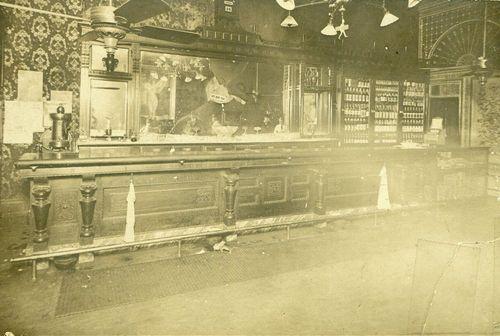Carry A. Nation first uses a hatchet in bar raid

One of the most prolific prohibition activists of the late 19th and early 20th centuries was Carry A. Nation who founded a local chapter of the Women’s Christian Temperance Union (WCTU) in her hometown of Medicine Lodge, KS. She campaigned heavily for the enforcement of the states liquor laws. She was deeply religious and spoke publicly, offering hundreds of lectures on Temperance and women’s issues while also authoring columns on those topics as well. Nation’s followers called themselves “Home Defenders” and they raided their first bar in December 1894. Nation became known for her attacks on bars, saloons, and taprooms all over the state. She would enter the establishments and using rocks or other projectiles destroy the bar, bottles of liquor and anything else that she deemed sacrilegious. While destroying the bars, whether she was alone or with her followers, would sing hymns, pray, and spew biblical-sounding abusive language. She argued that since the Kansas Constitution prohibited the purchase of alcohol the destruction of saloons was an acceptable means of battling the state’s thriving liquor trade. Carry would eventually become known nationwide for using a hatchet, but she didn’t begin using one until the end of 1900.
In early 1900 Carry had abandoned the nonviolent agitation of the WCTU for direct actions which she called “hatchetation”. In June alone she attacked six bars in Kiowa, KS. On December 27, 1900, at 8 a.m. Carry entered the elaborate bar at the Carey House which was also known as the Eaton Hotel in Wichita, KS. She began to smash all their bottles held in mahogany sideboards. She also smashed fixtures, and furniture using a hatchet. This was the first raid in which she used the weapon. She also destroyed a painting of Cleopatra taking a bath by notable Wichita artist John Noble.
“I decided to go to the Carey for several reasons, it was the most dangerous being the finest,” Nation said. “The low doggery will take the low and keep them low, but these so-called respectable ones will take the respectable, make them low then kick them out.”
When the raid began the drunks fled the bar while the bar tender stood frozen in place.
The raid took just 30 minutes and by 8:30 a.m. Carry was in jail after having caused nearly $3,000 or about $109,882.50 today in damages. She was jailed for three weeks forced to sleep on a concrete floor with no pillow, all without ever being charged for a crime. She was released on a writ of habeas corpus by her second husband David Nation. Less than a year later David filed for divorce. Over the next ten years until her death in 1911 she was arrested 32 times. After Nation’s anti-alcohol activities became well known, the slogan, “All Nations Welcome but Carry” quickly became a bar room staple. Her anti-alcohol crusade was engraved on her headstone erected by the WCTU and read, “Faithful to the cause of Prohibition, she hath done what she could.”
After the raid the Carey House or Eaton Hotel gained national recognition and was placed on the National Register of Historic Places on April 13, 1972. Today it is an apartment building, however the outside of the building appears as it did the day that Carry Nation visited. In July of 2018 the city of Wichita honored Carry A. Nation by unveiling a statue in her honor. Created by Wichita artist Babs Mellor, the life-size statue depicts the six-foot-tall Nation on the exact spot where she entered the bar. The statue shows Nation in her signature black floor length dress and shawl. She has an open Bible in one hand and hatchet in the other. Her legacy has lived on long after her death and her home in Medicine Lodge, KS is now a National Historic Landmark. Today no image of Carry A. Nation is complete without her trademark hatchet.
Thanks for reading. Be sure to share and subscribe. You can also help support independent journalism in Kansas by buying me a coffee at buymeacoffee.com/kscon.

Emily Brannan
Emily Brannan is a born and raised Kansan. Graduating from Missouri Southern State University in Joplin, MO with a Bachelor of Arts in History with a minor in American Studies, she is now a historian, writer, and researcher.

